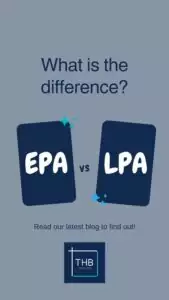Inheritance tax is changing in 2026
What farming families and business owners need to know If you own a farm,...- 11 February 2026
Posted: 28 August 2025
An EPA is a document authorising one or more people (Attorneys) to manage financial and property matters on behalf of an individual (Donor), in the event that the Donor loses mental capacity.
It is no longer possible to create an EPA as Lasting Powers of Attorney were designed to replace them. However, any EPA made before 30 September 2007 will continue to be valid.
An EPA can be used as soon as it is required, however, in order for it to remain valid, it must be registered with the Office of the Public Guardian as soon as donor “has become or is becoming incapable” of dealing with their own property and financial affairs.

LPAs were introduced on 1 October 2007 to replace EPAs and there are two types:
* Property and financial affairs
* Health and welfare
A Property and Financial Affairs LPA will allow you to choose who can make decisions about the following:
* Managing your Bank Accounts and investments including opening and closing accounts.
* Claiming and receiving benefits and other payments like pensions and rebates on your behalf.
* Paying bills, household, care fees etc.
* Buying, selling or renting any property that you own.
* Making gifts – limited to making gifts to people who are related to or connected with you for special occasions such as birthdays.
You should also consider having a separate LPA if you own a business as a sole trader or in a Partnership or are in certain professions.
You have the option to select whether your Attorneys can use a Property and Financial affairs LPA while you still have full mental capacity. This can be helpful if you feel you need help managing matters.
A Health and Welfare LPA allows you to choose someone to make decisions about your healthcare and welfare. Decisions about your personal welfare are wide-ranging. They can include:
* Decisions about where you live,
* How you are cared for
* What health care you receive
* Specific decisions about medical treatments
* More general decisions e.g. dietary requirements
A Health and Welfare LPA can only be used if you lose the ability to make your own decisions.
Yes, provided you are still able to make your own decisions. A Deed of Revocation will need to be completed to cancel the EPA and you will then be able to make LPAs.
If the EPA has already been registered, then an application needs to be sent to the Court of Protection, together with their cancellation fee.
You can only make LPAs if you have mental capacity.
The latest figures produced on the .Gov website indicate a decrease in Lasting Powers of Attorney.
“In January to March 2025, there were 299,976 LPAs registered, down 21% compared to the equivalent quarter in 2024.
LPA made up almost all (99.6%) of POAs registered in January to March 2025, with Enduring Powers of Attorney (EPAs) making up the other share. There were 1,198 EPAs registered in January to March 2025, down 24% on the equivalent quarter in 2024.”
Here at Taylor Haldane Barlex, our team of specialists can explain the benefits of a Lasting Power of Attorney and assist you in drawing up the documents to ensure that you have the appropriate protection in place.
For more information please contact our team today! Private client team experts call 01245 493577 or send an email. Our specialists are here to help you.
Emma Blakesley specialising in Wills and Probate and is based on our Great Baddow, Chelmsford office. Emma advises clients across all areas of Private Client law, including wills, estate planning, probate and estate administration, Lasting Powers of Attorney, and Court of Protection matters. Known for her thoughtful, client-centred approach, Emma strives to make even complex legal matters feel straightforward and supportive.
- 11 February 2026
- 09 February 2026
- 07 February 2026